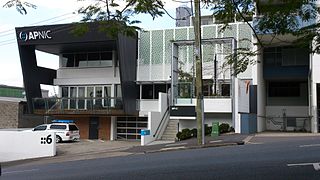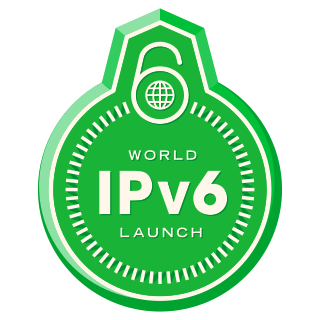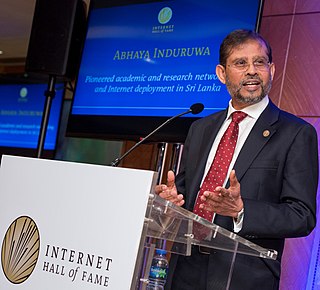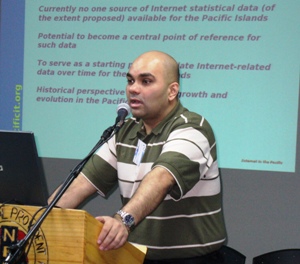
The Internet Engineering Task Force (IETF) is a standards organization for the Internet and is responsible for the technical standards that make up the Internet protocol suite (TCP/IP). It has no formal membership roster or requirements and all its participants are volunteers. Their work is usually funded by employers or other sponsors.

Vinton Gray Cerf is an American Internet pioneer and is recognized as one of "the fathers of the Internet", sharing this title with TCP/IP co-developer Bob Kahn.

APNIC is the regional Internet address registry (RIR) for the Asia-Pacific region. It is one of the world's five RIRs and is part of the Number Resource Organization (NRO).

The Internet Society (ISOC) is an American nonprofit advocacy organization founded in 1992 with local chapters around the world. Its mission is "to promote the open development, evolution, and use of the Internet for the benefit of all people throughout the world." It has offices in Reston, Virginia, U.S., and Geneva, Switzerland.
The Association for Progressive Communications (APC) is an international network of organizations that was founded in 1990 to provide communication infrastructure, including Internet-based applications, to groups and individuals who work for peace, human rights, protection of the environment, and sustainability. Pioneering the use of ICTs for civil society, especially in developing countries, APC were often the first providers of Internet in their member countries.
The global digital divide describes global disparities, primarily between developed and developing countries, in regards to access to computing and information resources such as the Internet and the opportunities derived from such access.
The Pacific Islands Chapter of the Internet Society (PICISOC) serves the Internet Society’s purposes by serving the interests of the global Internet community through its presence in the Pacific Islands. In addition to ISOC interests, PICISOC also focuses on local issues and developments and acts as an impartial advisor to governments and the public on matters of significant interest to Pacific Island people concerning the Internet and ICT technology in general.
Technology governance means the governance, i.e., the steering between the different sectors—state, business, and NGOs—of the development of technology. It is the idea of governance within technology and its use, as well as the practices behind them. The concept is based on the notion of innovation and of techno-economic paradigm shifts according to the theories by scholars such as Joseph A. Schumpeter, Christopher Freeman, and Carlota Perez.
The Korea Internet & Security Agency is the Ministry of Science and ICT's sub-organization dealing with the allocation and maintenance of South Korea's IPv4/IPv6 address space, Autonomous System Numbers, and the .kr country code top-level domain (ccTLD), and also responsible for the cybersecurity of the Internet within South Korea, and runs the Korea Computer Emergency Response Team Coordination Center, a.k.a. KrCERT/CC, for the private sector of the country. Other roles include but are not limited to, the promotion of safe Internet usage and Internet culture, detecting and analyzing malware/viruses on the web, privacy protection, operating root CA, education on Internet and cybersecurity, and various other cybersecurity issues.

Digital rights are those human rights and legal rights that allow individuals to access, use, create, and publish digital media or to access and use computers, other electronic devices, and telecommunications networks. The concept is particularly related to the protection and realization of existing rights, such as the right to privacy and freedom of expression, in the context of digital technologies, especially the Internet. The laws of several countries recognize a right to Internet access.

Tarek Kamel was an Egyptian politician and computer engineer expert in global Internet governance issues.

Internet governance consists of a system of laws, rules, policies and practices that dictate how its board members manage and oversee the affairs of any internet related-regulatory body. This article describes how the Internet was and is currently governed, some inherent controversies, and ongoing debates regarding how and why the Internet should or should not be governed in future.

The Internet Governance Forum (IGF) is a multistakeholder governance group for policy dialogue on issues of Internet governance. It brings together all stakeholders in the Internet governance debate, whether they represent governments, the private sector or civil society, including the technical and academic community, on an equal basis and through an open and inclusive process. The establishment of the IGF was formally announced by the United Nations Secretary-General in July 2006. It was first convened in October–November 2006 and has held an annual meeting since then.
The Pacific INET, or PacINET, conference is organised by the Pacific Islands Chapter of the Internet Society, (PICISOC) and is the leading Information and Communications Technology conference in the Pacific Islands.
Internet network operators' groups (NOGs) are informal, country-based, or regional groups that exist to provide forums for Internet network operators to discuss matters of mutual interest, usually through a combination of mailing lists and annual conferences. Although these groups have no formal power, their members are typically influential members of the Internet service provider (ISP), Internet exchange point (IXP), regional Internet registry (RIR), operational security community, Internet Protocol version 6 (IPv6) operations, Domain Name System (DNS) and root zone operations, and other network operations communities, and discussions within these groups are often influential in the overall process of ensuring the Internet remains operational, robust, secure, and stable. They also allow networking professionals and other members of the research and technical communities to update each other on their work, share news and updates, exchange best practices, discuss new technologies or protocols, teach and learn from each other, network with other members of the community, and discuss current network- and Internet-related issues and challenges.

World IPv6 Day was a technical testing and publicity event in 2011 sponsored and organized by the Internet Society and several large Internet content services to test and promote public IPv6 deployment. Following the success of the 2011 test day, the Internet Society carried out a World IPv6 Launch day on June 6, 2012 which, instead of just a test day, was planned to permanently enable IPv6 for the products and services of the participants.

Abhaya Induruwa is the inaugural Professor V K Samaranayake Endowed Professor of Computing, University of Colombo School of Computing, Sri Lanka. Having served as the Director of Cyber Innovation Hub he recently retired from the Canterbury Christ Church University in the United Kingdom where he researched into security and forensic investigation of Internet of Things (IoT). Currently he is engaged in promoting IoT in digital agriculture as a disruptive technology, primarily in developing countries, leading to smart agriculture resulting in higher yields in food production. Induruwa is considered the father of Internet in Sri Lanka.
Philip D. Coombs was the Washington State Archivist under Secretary of State Ralph Munroe and then under Secretary of State Sam Reed from October 1999 through his sudden death in July 2001.

Satish Babu is a Free Software activist, early Internet advocate, and development professional based out of Kerala, India. He is the founding Director of the International Centre for Free and Open Source Software (ICFOSS), an autonomous academic/research institution of the Government of Kerala, India, where he worked from March 2011 to September 2015. He was earlier the CEO of SIFFS, an NGO of small-scale artisanal fishers of south India; a co-founder and President of InApp Information Technologies; and is associated with international and national professional societies such as IEEE, Internet Society (ISOC), ICANN, and the Computer Society of India (CSI).
Christine Yvonne Malina-Maxwell is a British Internet content pioneer and educator. She is the creator and co-founder of Magellan, co-founder of the software company Chiliad and the author of several books. She was the Program Manager of Learning Technologies at the University of Texas at Dallas.









